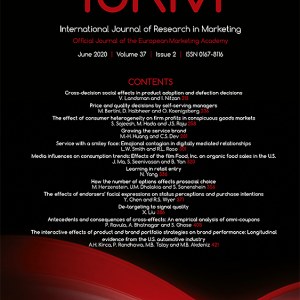
Stremersch, S., Korkames, J. and Stanley, T. (2025). Meta-Analysis of Advertising Effectiveness: New Insights from Improved Bias Corrections International Journal of Research in Marketing, :.
-
Affiliated author
-
Publication year2025
-
JournalInternational Journal of Research in Marketing
The authors employ recently developed meta-analysis methods to better correct for misspecification, aggregation, and publication selection bias. Applying these methods in a new meta-analysis of advertising effectiveness, using the largest database on business-to-consumer own-brand advertising elasticities (538 elasticities), the authors show that better methods greatly reduce (more than fivefold) the meta-analytic overall estimate of advertising effectiveness relative to prior estimates, bringing them more in line with results from randomized controlled trials. They first obtain an average short-term elasticity of 0.0008 and a long-term elasticity of 0.03. They then explore how and when conditional advertising elasticity estimates meaningfully differ across relevant factors through advanced multiple meta-regression approaches that yield practically meaningful conditional estimate ranges. Over time, reported meta-analytic estimates of advertising-sales elasticities have become smaller, largely due to improvements in meta-analytic methods, while advertising effectiveness has increased—consistent with the finding that internet advertising, the most recent medium, exhibits the highest elasticity. For advertising scholars and professionals, this study provides an updated (i.e., lower) benchmark on overall advertising effectiveness, as well as more robust insights regarding when and how it varies. For analysts, it charts an improved methodological framework for marketing that should guide meta-analytic research on and beyond advertising effectiveness.